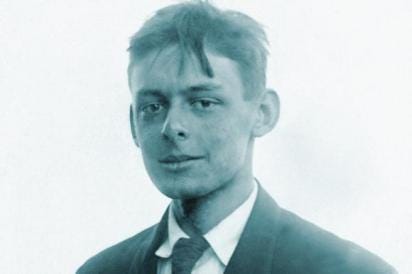An hour in a hotel room with Anthony Hopkins
What was your first experience with art that changed your life?
Next up on the Hey Pop podcast will be Patti Smith, and I’ve been thinking a lot about our conversation, which we recorded last month at her house in the Village. At one point, she recounts her first transformative experience with art, the teenage epiphanic moment that illuminated her path, that made her understand that she would someday need to leave New Jersey for New York City and dedicate her life to making art.
I wonder how much common ground we all share in this regard, even if we didn’t end up pursuing a career as an artist: Did you have such an experience? How and when did it happen?
I don’t necessarily mean early obsessions like listening to John Denver in the station wagon with your parents, learning all the words, singing along, and falling in love with the melodies. Although it could be that. But rather I mean encountering a work of art, high or low—a book, performance, painting, photo, poem, song, film—that shifted the ground under you, that utterly changed how you saw the world and your place in it, that rearranged how you envisioned the rest of your life.
If you’re so inclined, tell us more about your experience in the comments.
Here was that moment for me:
I attended a large public high school outside of Syracuse, New York that was populated with all the classic cliques, like in a John Hughes film—goths, punks, nerds, drama kids, band kids, chess kids, cheerleaders, artists, jocks, and so on. I tried to move among them, but, early on, I found myself most often piled in with the jocks. I was tall and played a few sports, none of them very well, and while I did love basketball, I grew increasingly uneasy with the keg-party culture that was taking hold among that group during freshman year. It was as if we were auditioning for fraternities and sororities, and I personally didn’t want any part of it.
A wonderful teacher must have recognized that I was looking for a way out, and at the start of my sophomore year, she encouraged me to enroll in her introductory poetry writing class. I showed up on the first day with a flat-top haircut and basketball sneakers, and over the coming weeks, I distinctly remember my defenses breaking down as I gave way to her gentle instruction, opened up creatively, and came to trust my dozen classmates. At the right moment, she handed me a worn slim copy of T.S. Eliot’s The Love Song of J. Alfred Prufrock, and the poem turned me inside out. Eliot’s poem conjured a mysterious, seductive, and melancholy atmosphere that wonderfully articulated the angst of those mid-teen years.
Fast forward to my senior year, and I’d become a cliché of another sort—I walked through the halls of the school barefoot, with long hair, a notebook tucked under my arm, probably wearing a vest I’d picked up at a thrift store. I’d quit sports and now spent most of my time with the musician crowd and whomever had a serious interest in poetry. I was perfectly ridiculous and probably more than a bit precious, but I’d found my calling. I wanted to be a poet, and the watershed moment had been when my teacher, Nan Faraday, handed me Prufrock. I was eager to escape Syracuse and get far out into the world, so I graduated from school a semester early, was voted “most changed” in the yearbook, skipped the commencement ceremonies, and headed for college in Colorado to study literature and creative writing.
I can’t overstate the importance of that teacher, who I’ll write about at another time, nor of that poem landing in my hands at the moment I needed it.
Years later, while helping create the Poetry Out Loud program for the National Endowment for the Arts, I met with Anthony Hopkins in a Santa Monica hotel room to record him reciting his favorite poems. I hadn’t cracked the spine of Prufrock for a long while by then, but sitting in that room with Hopkins and hearing him recite it across the table from me, the etherial quality of the verse that had first captivated me came swirling back into the room, especially as Hopkins slowed down for the final lines, and you could hear a bit of a choke enter his voice, like someone who had lived Prufrock’s experience firsthand.
Here’s Anthony Hopkins’ rendition of The Love Song of J. Alfred Prufrock from that afternoon in the hotel room, circa 2005.
Prufrock was first published in Poetry Magazine in 1915 when Eliot was only 26, even though the poem seems as if it were written by an old man.
The Love Song of J. Alfred Prufrock
by T. S. Eliot
S’io credesse che mia risposta fosse
A persona che mai tornasse al mondo,
Questa fiamma staria senza piu scosse.
Ma percioche giammai di questo fondo
Non torno vivo alcun, s’i’odo il vero,
Senza tema d’infamia ti rispondo.1
Let us go then, you and I,
When the evening is spread out against the sky
Like a patient etherized upon a table;
Let us go, through certain half-deserted streets,
The muttering retreats
Of restless nights in one-night cheap hotels
And sawdust restaurants with oyster-shells:
Streets that follow like a tedious argument
Of insidious intent
To lead you to an overwhelming question...
Oh, do not ask, “What is it?”
Let us go and make our visit.
In the room the women come and go
Talking of Michelangelo.
The yellow fog that rubs its back upon the window-panes,
The yellow smoke that rubs its muzzle on the window-panes,
Licked its tongue into the corners of the evening,
Lingered upon the pools that stand in drains,
Let fall upon its back the soot that falls from chimneys,
Slipped by the terrace, made a sudden leap,
And seeing that it was a soft October night,
Curled once about the house, and fell asleep.
And indeed there will be time
For the yellow smoke that slides along the street,
Rubbing its back upon the window-panes;
There will be time, there will be time
To prepare a face to meet the faces that you meet;
There will be time to murder and create,
And time for all the works and days of hands
That lift and drop a question on your plate;
Time for you and time for me,
And time yet for a hundred indecisions,
And for a hundred visions and revisions,
Before the taking of a toast and tea.
In the room the women come and go
Talking of Michelangelo.
And indeed there will be time
To wonder, “Do I dare?” and, “Do I dare?”
Time to turn back and descend the stair,
With a bald spot in the middle of my hair —
(They will say: “How his hair is growing thin!”)
My morning coat, my collar mounting firmly to the chin,
My necktie rich and modest, but asserted by a simple pin —
(They will say: “But how his arms and legs are thin!”)
Do I dare
Disturb the universe?
In a minute there is time
For decisions and revisions which a minute will reverse.
For I have known them all already, known them all:
Have known the evenings, mornings, afternoons,
I have measured out my life with coffee spoons;
I know the voices dying with a dying fall
Beneath the music from a farther room.
So how should I presume?
And I have known the eyes already, known them all—
The eyes that fix you in a formulated phrase,
And when I am formulated, sprawling on a pin,
When I am pinned and wriggling on the wall,
Then how should I begin
To spit out all the butt-ends of my days and ways?
And how should I presume?
And I have known the arms already, known them all—
Arms that are braceleted and white and bare
(But in the lamplight, downed with light brown hair!)
Is it perfume from a dress
That makes me so digress?
Arms that lie along a table, or wrap about a shawl.
And should I then presume?
And how should I begin?
Shall I say, I have gone at dusk through narrow streets
And watched the smoke that rises from the pipes
Of lonely men in shirt-sleeves, leaning out of windows? ...
I should have been a pair of ragged claws
Scuttling across the floors of silent seas.
And the afternoon, the evening, sleeps so peacefully!
Smoothed by long fingers,
Asleep ... tired ... or it malingers,
Stretched on the floor, here beside you and me.
Should I, after tea and cakes and ices,
Have the strength to force the moment to its crisis?
But though I have wept and fasted, wept and prayed,
Though I have seen my head (grown slightly bald) brought in upon a platter,
I am no prophet — and here’s no great matter;
I have seen the moment of my greatness flicker,
And I have seen the eternal Footman hold my coat, and snicker,
And in short, I was afraid.
And would it have been worth it, after all,
After the cups, the marmalade, the tea,
Among the porcelain, among some talk of you and me,
Would it have been worth while,
To have bitten off the matter with a smile,
To have squeezed the universe into a ball
To roll it towards some overwhelming question,
To say: “I am Lazarus, come from the dead,
Come back to tell you all, I shall tell you all”—
If one, settling a pillow by her head
Should say: “That is not what I meant at all;
That is not it, at all.”
And would it have been worth it, after all,
Would it have been worth while,
After the sunsets and the dooryards and the sprinkled streets,
After the novels, after the teacups, after the skirts that trail along the floor—
And this, and so much more?—
It is impossible to say just what I mean!
But as if a magic lantern threw the nerves in patterns on a screen:
Would it have been worth while
If one, settling a pillow or throwing off a shawl,
And turning toward the window, should say:
“That is not it at all,
That is not what I meant, at all.”
No! I am not Prince Hamlet, nor was meant to be;
Am an attendant lord, one that will do
To swell a progress, start a scene or two,
Advise the prince; no doubt, an easy tool,
Deferential, glad to be of use,
Politic, cautious, and meticulous;
Full of high sentence, but a bit obtuse;
At times, indeed, almost ridiculous—
Almost, at times, the Fool.
I grow old... I grow old...
I shall wear the bottoms of my trousers rolled.
Shall I part my hair behind? Do I dare to eat a peach?
I shall wear white flannel trousers, and walk upon the beach.
I have heard the mermaids singing, each to each.
I do not think that they will sing to me.
I have seen them riding seaward on the waves
Combing the white hair of the waves blown back
When the wind blows the water white and black.
We have lingered in the chambers of the sea
By sea-girls wreathed with seaweed red and brown
Till human voices wake us, and we drown.
The Italian epigraph:
If I but thought that my response were made
to one perhaps returning to the world,
this tongue of flame would cease to flicker.
But since, up from these depths, no one has yet
returned alive, if what I hear is true,
I answer without fear of being shamed.








Wow.
I just had another ‘moment’ reading that.
Thanks for this, Dan. The recording made my day. 🎙️⬇️